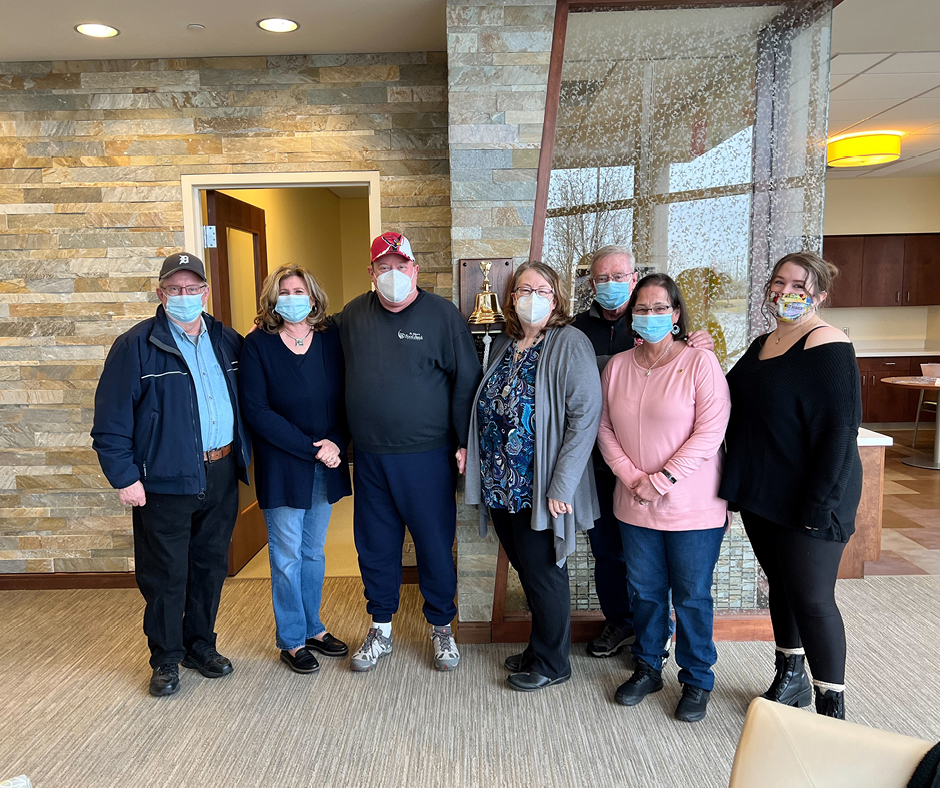Author: Sherry Farney
This spring marks the fourth year of treating patients at the McLaren Proton Therapy Center, part of the Karmanos Cancer Network, in Flint. Since 2018, the capacity of the center has grown and proton therapy experts are able to treat many more patients, with plans to expand during the next two years. Hundreds of patients have gone through proton therapy treatment, including the 500th patient, who completed treatment for glioblastoma, a type of brain cancer, in late March 2022.
“I have a friend on the east coast whose daughter had brain cancer and he suggested I look into proton therapy,” said Jeff West, age 62, of Fenton. “My sister-in-law helped research it for me and my fiancée DeAnn and I decided I should try it.”

West (pictured above in his Arizona Cardinals hat) was diagnosed in December 2021 after having seizure-like episodes that later turned into severe headaches and bouts of dizziness. He had a tumor removed in early January and then began chemotherapy in conjunction with his proton therapy treatment which began on February 10.
The only real side effect that I experienced from the proton therapy was being a little tired the last two weeks of treatment,” said West. “I will definitely tell people about this place and the positive experience I’ve had.”
Proton therapy is a beneficial treatment for solid tumors located near important organs and structures, including:
- Bladder Cancer
- Brain and Central Nervous System Cancer
- Breast Cancer
- Esophageal Cancer
- Head, Neck, and Skull Base Cancer
- Kidney Cancer
- Lymphoma
- Liver Cancer
- Lung and Thorax Cancer
- Pancreatic Cancer
- Pediatric and Young Adult Cancers
- Prostate Cancer
- Sarcoma
- Spine and Chest Wall Cancer
- Select Gynecological and Gastrointestinal Cancers
- Recurrent disease
Proton therapy delivers radiation, targeted to the tumor, with no exit dose. This means radiation stops at the depth of the tumor, without unnecessary radiation exposure to much of the surrounding healthy tissue. As a result, patients experience minimal side effects and a better quality of life during and after treatment.
“Proton therapy is a way to give treatment safely with minimal side effects, which is so important when the cancer is near or part of someone’s vital organs, such as the brain.” said Brian Yeh, MD, PhD., radiation oncologist. “The treatment doesn’t damage critical, normal tissue nearby. Glioblastoma is an aggressive cancer and if it were to grow back, proton therapy, unlike traditional radiation therapy, can be a treatment option again.”
Dr. Yeh is a member of the team of radiation oncologists who specialize in proton therapy. The group also includes Hesham Gayar, MD, medical director of the McLaren Proton Therapy Center; Christian Hyde, MD, DABR; and Omar Gayar, MD. The team looks forward to more milestones in the future. With an expansion of the center nearing its beginning, the McLaren Proton Therapy Center will nearly double the capacity for treatment and give more cancer patients access to proton therapy upon completion.
Recently diagnosed cancer patients, or those looking for a second opinion, may call (855) MY-PROTON (855-697-7686) or visit mclaren.org/protonconsultation.